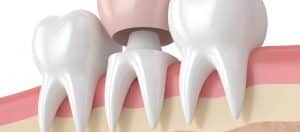Dental implants can offer a long-lasting solution to replace your missing teeth. They look and function like your natural teeth and provide a permanent alternative to traditional options like dentures or bridges.
The journey to full recovery after getting dental implants involves several stages. The healing process can take several months. Therefore, you need patience and proper care to get the desired success.
This article discusses the dental implant process in detail, focusing on each healing stage and what you can expect after surgery. You will also learn how our experienced dentists in Port Melbourne can ensure smooth and comfortable dental implants to suit all Melbourne patients.
Dental Implants in Melbourne Involves Minor Surgery
An implant is a small post surgically inserted into the jawbone. It forms a stable foundation for a replacement tooth or teeth. Implants are generally made from titanium, a biocompatible metal that integrates well with your body. A crown, which resembles a natural tooth is attached to the implant. The cost depends on the materials you choose and various other factors. Dentures can also be designed to attach securely to dental implants.
The placement of an implant involves a minimally invasive surgical procedure. Your dentist will position the implant in the jawbone to fill the space of your missing tooth. In some cases, this treatment procedure can be performed immediately after a tooth extraction.
Once the implant is placed, the surrounding bone gradually fuses with it, ensuring a firm and stable hold. Dental implants offer a solution for replacing anything from a single tooth to an entire arch of teeth. They are a popular choice due to their natural appearance and functionality. They help to preserve bone density in your jaw.
Unlike traditional bridges, implants don’t require modifying nearby healthy teeth. This makes this procedure a cost-effective and conservative option in many cases. Recent research proves that 93% of tissue-level implants lasted for 20 years.
Dental Implant Healing Stages
Stage 1: Initial Consultation and Treatment Planning
Your dentist will check your oral health, take X-rays or 3D scans, and develop a personalised treatment plan. During this stage, your dentist will also determine whether you need any additional treatment, like bone grafting or sinus lifts. Once your treatment plan is confirmed, you’ll move to the surgical phase.
Stage 2: Implant Placement Surgery
Dental implant surgery is the first major step toward restoring your smile. The procedure involves placing a titanium post into your jawbone, which serves as an artificial tooth root.
Depending on the number of implants needed and your individual case, this surgery could take one to several hours.
- Local Anaesthesia or Sedation: Your dentist will administer local anaesthesia. In more complex cases, sedation options may also be available.
- Insertion of the Implant: Your dentist will make an incision in the gum to expose the bone where the implant should be placed. A hole is then drilled into the bone, and the titanium post is inserted. This post will act as the foundation for the eventual crown, bridge, or denture.
After surgery, the healing process officially begins, and this is where the body does the heavy lifting.
Stage 3: Initial Healing Phase or Osseointegration
It is a vital healing process. In this stage, the bone fuses with the dental implant to secure it firmly in the jawbone. This stage is important for long-term success as it confirms the stability and functionality of your teeth.
The bone cells gradually grow around your teeth implant to form a strong bond and give a foundation for the replacement tooth or teeth. Generally, the healing process takes several months to complete. You should follow your dentist’s post-operative care instructions during this period to get proper healing and reduce complications.
Stage 4: Gum Healing and Abutment Placement
The abutment is a connector piece that eventually hold the crown or prosthetic tooth in place. This is a minor outpatient process that can be done under local anaesthesia.
Gum Shaping: When the abutment is placed, the dentist makes another small incision in the gum to expose the implant. The abutment is then secured, and the gums are allowed to heal around it. While the gums heal, your dentist prepares the final crown or denture to be placed on top of the abutment.
Stage 5: Final Restoration (Crown or Denture Placement)
This step involves placing the crown, bridge, or denture onto the abutment. If you’re receiving a single-tooth implant, a crown that matches the colour and appearance of your natural teeth will be secured in place. For multiple implants, bridges or dentures can be attached to restore a full arch of teeth.
Customisation: The crown or prosthetic tooth is custom-made to match the contour and colour of your natural teeth. It offers a seamless blend with your smile.
Final Check: Once the restoration is attached, your dentist in Melbourne will check the fit, bite, and overall aesthetics. They’ll also provide care instructions to help maintain the longevity of your new dental implant. This is the final phase in your dental implant journey, and now you can enjoy the full function and appearance of your new tooth or teeth.
Aftercare and Long-Term Maintenance
Now that your dental implants are complete, maintaining them is crucial for long-term success. While implants don’t decay like natural teeth, they still require regular care to prevent gum disease and ensure the surrounding bone remains healthy.
Regular Dental Checkups: Make sure to give a visit to your dentist every 6 months for cleanings and checkups. This will help keep your implants in excellent condition.
Daily Oral Hygiene: Brush twice a day and floss around your implant to prevent plaque buildup.
Healthy Habits: Avoid smoking and alcohol consumption, as these habits can negatively affect the healing process and long-term success of implants.
Recent research shows that smokers are 140% more likely to get implant failure compared to non-smokers. This proves the importance of a healthy lifestyle in implant success.
More from Your Experienced Implant Dentist in Port Melbourne
The thought of getting dental implants may make you anxious, especially when it comes to pain. Thanks to the advancements in modern implant dentistry, patients experience minimal to no discomfort during the treatment procedure. You may experience post-surgery discomfort, which is usually mild and easily manageable.
Choosing an expert implant dentist in Port Melbourne, like those at Bay Street Dental Group, can make the process smooth. We deliver satisfying results that last long. Dental implants in melbourne provide a durable, comfortable solution to restore your smile for a lifetime.
We use our expertise and innovative techniques to minimise your discomfort and improve the healing process. Contact us at (03) 9646 2577 to discuss and get a painless dental implant treatment.












